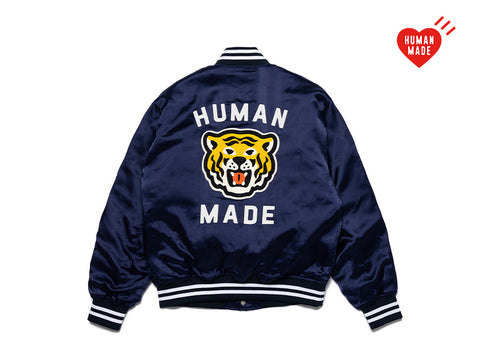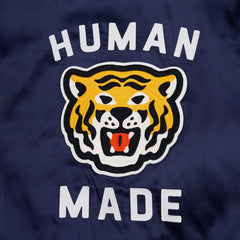-
human made camping shorts (beige)
Regular price 119,00 €Sale price 119,00 € Regular priceUnit price per250,00 €Sale -
human made camping s/s shirt (olive drab)
Regular price 84,00 €Sale price 84,00 € Regular priceUnit price per300,00 €Sale -
human made chambray l/s shirt (blue)
Regular price 164,50 €Sale price 164,50 € Regular priceUnit price per335,00 €Sale
- The history of Human Made: A look into the beginnings of the brand
- The design philosophy of Human Made: How is clothing created?
- The importance of materials in Human Made
- Human Made: How the brand is influencing the fashion industry
- A consideration of human made's eco-friendly practices
- FAQ - Human Made
The history of Human Made: A look into the beginnings of the brand
The brand was founded in 2010 by Japanese designer NIGO, who is known for his work with A Bathing Ape and his love for vintage Americana style. Human Made was born out of NIGO's desire to create clothing that reflected his passion for vintage clothing and American pop culture.
From the beginning, Human Made's designs were influenced by classic workwear and vintage sportswear. The brand quickly gained a reputation for producing high-quality, well-crafted clothing with a strong attention to detail. The brand's logo, which features a heart with the words "GEARS FOR FUTURISTIC TEENAGERS" written inside, became a recognizable symbol of the brand's unique aesthetic.
Over the years, Human Made has collaborated with other brands and artists, including Adidas, Porter, and Pharrell Williams. Today, the brand's clothing can be found in boutiques and high-end department stores around the world, and it continues to be a favorite among fashion-forward consumers who appreciate the brand's attention to detail, quality craftsmanship, and unique style.
As we look back at the history of Human Made, it's clear that the brand's success can be attributed to its dedication to producing high-quality, well-crafted clothing that is inspired by classic Americana and vintage pop culture. With its strong design philosophy and unique aesthetic, it's no wonder that Human Made continues to be a leading force in the fashion industry today.
The design philosophy of Human Made: How is clothing created?
At the heart of Human Made is a strong design philosophy that informs every piece of clothing the brand creates. In this article, we'll take a closer look at the design philosophy of Human Made and explore how the brand creates its unique clothing.
One of the key principles of Human Made's design philosophy is the idea of creating clothing that is both timeless and functional. The brand draws inspiration from classic workwear and vintage sportswear, and incorporates these elements into its designs in a way that feels fresh and contemporary.
Another important aspect of Human Made's design philosophy is a focus on quality craftsmanship and attention to detail. Every piece of clothing is made with the utmost care and attention, using high-quality materials and construction techniques that ensure the clothing will last for years to come.
The brand also places a strong emphasis on collaboration and creativity, often working with other brands and artists to create unique and innovative designs. This collaborative approach allows Human Made to push the boundaries of what is possible in clothing design, while still staying true to its core aesthetic.
When it comes to actually creating the clothing, Human Made uses a combination of traditional and modern techniques. Many of the brand's designs are made using vintage sewing machines, which give the clothing a unique, handmade feel. At the same time, the brand also incorporates modern technology and materials into its designs, ensuring that the clothing is both functional and comfortable to wear.

The importance of materials in Human Made
Materials play a crucial role in the design and production of Human Made clothing. The brand is known for its commitment to using high-quality materials, both natural and synthetic, that are both durable and functional.
One of the materials that Human Made uses extensively is cotton. The brand sources only the highest quality cotton, often from Japan, and uses it to create a range of clothing, from t-shirts to jackets. Cotton is valued for its durability, breathability, and versatility, making it a perfect choice for everyday wear.
Another material that Human Made uses frequently is denim. The brand is particularly known for its denim jackets, which are crafted from high-quality, heavyweight denim that is both durable and stylish. The denim is often treated with special washes and dyes to create unique, one-of-a-kind pieces.
In addition to these traditional materials, Human Made also incorporates modern fabrics and technologies into its designs. The brand is known for using advanced synthetic materials, such as Gore-Tex and Polartec, to create clothing that is both functional and stylish. These materials are often used in jackets and outerwear, providing protection from the elements without sacrificing style.
Human Made: How the brand is influencing the fashion industry
Human Made has made a significant impact on the fashion industry, particularly in the realm of streetwear. The brand has developed a dedicated following of fashion enthusiasts and collectors who appreciate the brand's unique aesthetic, high-quality materials, and attention to detail.
One way in which Human Made has influenced the fashion industry is through its collaborations with other brands and designers. The brand has worked with a variety of companies, including Adidas, Neighborhood, and Nigo's A Bathing Ape, to create limited-edition collections that combine Human Made's signature style with the design elements of other brands.
Human Made has also been instrumental in bringing Japanese streetwear to a global audience. The brand's founder, Nigo, is a well-known figure in the Japanese fashion industry, and his work with Human Made has helped to showcase the unique aesthetic of Japanese streetwear to a wider audience.
In addition to its collaborations and promotion of Japanese streetwear, Human Made has also been influential in promoting sustainability and ethical fashion practices. The brand is committed to using high-quality, environmentally friendly materials and production methods, and has been recognized for its efforts to reduce its carbon footprint and promote fair labor practices.


A consideration of human made's eco-friendly practices
Human Made is committed to eco-friendly practices and this is evident in their use of materials and production methods. The brand acknowledges the importance of sustainability and is making an effort to reduce its environmental impact.
To promote eco-friendliness, Human Made uses organic and recycled materials in their products. For instance, the brand has incorporated recycled polyester in some of their designs to decrease waste and reduce the utilization of new resources. Additionally, organic cotton has also been used by Human Made in some of their designs which is grown without the use of harmful chemicals or pesticides.
Moreover, Human Made promotes eco-friendliness by implementing sustainable and ethical production methods in collaboration with factories and manufacturers. These methods include minimizing water and energy usage and reducing waste. This ensures that the production of Human Made's products has a minimal negative impact on the environment.
In addition, Human Made is also working towards reducing its carbon footprint by using eco-friendly packaging materials. They utilize recyclable materials in their packaging and aim to minimize waste generated during the shipping process.
FAQ - Human Made
What is the design philosophy of Human Made?
The design philosophy of Human Made focuses on taking inspiration from vintage clothing and Japanese pop culture to create unique and modern clothing designs.
What materials does Human Made use in its clothing?
Human Made uses a variety of materials including organic and recycled cotton, recycled polyester, and leather.
Is Human Made an eco-friendly brand?
Yes, Human Made is committed to eco-friendly practices such as using organic and recycled materials, implementing sustainable and ethical production methods, and using eco-friendly packaging materials.
Does Human Made offer clothing for both men and women?
Yes, Human Made offers clothing for both men and women.
What is the future of Human Made?
Human Made continues to grow as a brand and has recently expanded into new markets. They are expected to continue to release innovative and unique clothing designs while promoting eco-friendliness and sustainability.







